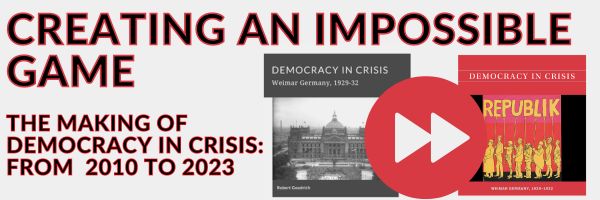
By: Robert Goodrich
Professor of History
Northern Michigan University
After integrating RTTP into my classes at Northern Michigan University and attending the annual faculty conference at Barnard, I started working on a Weimar game (what ultimately became titled Democracy in Crisis: Germany, 1929-32) in 2010. Mark Carnes and I had a conversation at one point a few years later about it, and, paraphrasing, he stated that everyone had always joked that it would be impossible to do a Weimar game—it just be too complicated and polarizing. I was naively unsure how to take the comment.
Of course, by that time I already had a beta version of the game. I thought I had come up with some new mechanics that could integrate the abstraction of Weimar’s fickle public opinion and sense of crisis (what I came to call the “Stability Index”). Regarding mechanics, I had followed Nick Proctor’s advice. “Throw in the kitchen sink” is what I remember him telling me during the early design phase, “You can edit it back later.” I responded by making a rather wonky game (it still has a lot of that complexity even after Nick encouraged me to take out the kitchen sink—sorry). I also tried to hit the reality that every single modern issue was on the table during Weimar, but the number of issues kept expanding to either unmanageability or too much open-endedness in terms of what issues instructors and players could choose to integrate.
Most of these were resolved over time through play testing. Issues that did not generate enough “heat” (I think this was John Moser’s term) were dropped (labor-management relations and religion); so, too, were those where players showed a tendency to simply replicate modern American discussions (abortion, gay rights, the death penalty). Some mechanics were dropped to keep the game focused on debate (trade unions and finances).
It remains a bit more complicated than most, but within expectations for one of RTTP’s bigger games. In fact, “big” is where this game really unfolds—it works best with a large classroom from 20+ given the fractured nature of Weimar politics. In the end, it hits the main goal of exploring how democracies die through polarization, radicalization, gridlock, and constitutional shenanigans. Generally, players come to appreciate the desperation of moderate politicians torn between extremes as the middle frays, and why they, in that desperation, might be willing to consider previously unthinkable alliances (in this case, a presumably tactical and temporary alliance with the far-right populism of the fascists).
And now it is 2023. Parliamentary gridlock. Polarization and echo chambers. Hysteria and moral panic. Post-truth discourse and hostility to a free press. Refusal to accept democratic outcomes. Politics as theatre rather than legislation. Corruption. Calls for violence against political opponents. Calls for insurrection and civil war. Xenophobia and national chauvinism. Amplification of counter-factual conspiracy theories. Support of tyrannies abroad. Attacks on and scapegoating of the most isolated members of society. Mainstream enabling of openly authoritarian rhetoric and policies. And, as I write this, the referral for criminal charges, including sedition, against a former president who has pandered to blatant racists and called for the literal “termination” of the Constitution in order to be restored to power.
I started this project in 2010. I saw it as history. As it now reaches classrooms in 2023, I am not so sure it is not a bit more chilling than a mere historical exercise anymore. To repeat my comment in the game’s introduction, democracies do not die, they are murdered. There is motive and process. And someone takes the necessary actions. Usually, they even confess before the deed is done. If the game has any value, I hope that it is to help us see how a democracy is undermined, why people act in this manner, and how to recognize the actors. And then to take action to prevent it. These are all choices on all sides. And there are always alternatives.
Democracy in Crisis is one of the many games being offered at this year's Annual Institute. If getting first-hand experience playing the finished version with the author himself interests you, you can register today on our official event page!
About the Author
Robert Goodrich’s research interests lie in Modern Central European history with a broad and integrative approach. His research and teaching emphasizes cultural and social history and the interplay of factors such as labor, gender, sexuality, and religion in identity construction. The nature of his research into religion and identity also requires a comparative view of European and American experiences, reflected in his interest in transnational history and recent focus on questions of identity related to Austro-Hungarian migration to, from, and through Michigan. Goodrich also works to promote internationalization at Northern Michigan University and has taken students to Spain, Peru, Greece, and most regularly, to Austria.
Blog Author Questionnaire
One word to describe faculty: Engaged
Two words to describe (your) school: Supportive, Humane
Three words to describe students: Kind, Underprepared, Distracted
Four words to describe favorite games: Team-Based, Open-Ended, Immersive, Problem-Solving
Five words to describe Reacting: Contingent, Document-Based, Confrontational, Student-Centered, In-Depth


